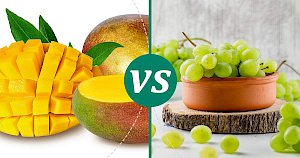Grapes vs Mango: Nutrition & Calories Compare


Grape vs Mango
Nutrition Facts
Serving size:
change
5g10g15g20g30g40g50g60g80g100g120g140g160g180g200g220g250g300g350g400g450g500g600g700g800g900g1000g
1oz2oz3oz4oz5oz6oz7oz8oz10oz12oz15oz20oz25oz30oz35oz40oz50oz
Amount Per Serving:
Serving size:
change
5g10g15g20g30g40g50g60g80g100g120g140g160g180g200g220g250g300g350g400g450g500g600g700g800g900g1000g
1oz2oz3oz4oz5oz6oz7oz8oz10oz12oz15oz20oz25oz30oz35oz40oz50oz
Amount Per Serving:
Grape vs Mango 100g Compare
| per 100g | Grapes | Mango |
|---|---|---|
| Calories | 67 | 78 |
| Carbohydrates | 17.15 g | 17.4 g |
| Fat | 0.35 g | 0.68 g |
| Saturated fat | 0.11 g | 0.09 g |
| Dietary fiber | 0.9 g | 1.29 g |
| Protein | 0.63 g | 0.69 g |
| Water | 81.3 g | 80.79 g |
| Calcium | 14 mg | 10.02 mg |
| Magnessium | 5 mg | 10.57 mg |
| Potassium | 191 mg | 204.4 mg |
| Vitaminium A | 100 µg | 1082 µg |
| Vitaminium B1 (Thiamine) | 0.092 mg | 0.028 mg |
| Vitaminium B2 (riboflavin) | 0.057 mg | 0.038 mg |
| Vitaminium B3 (Niacin) | 0.3 mg | 0.669 mg |
| Vitaminium B5 | 0.05 mg | 0.16 mg |
| Vitaminium B6 | 0.11 mg | 0.108 mg |
| Vitaminium B9 (Folic acid) | 0.004 mg | 0.043 mg |
| Vitaminium C | 4 mg | 168.1 mg |
| Vitaminium E | 0.19 mg | 0.9 mg |
| Vitaminium K | 0.015 µg | 0.004 µg |
| Beta karoten | 39 mg | 17 mg |
Delving Into the Delicious World of Grapes and Mangoes
When it comes to choosing between grapes and mangoes, it's not just a matter of taste but also of the rich histories and nutritional benefits these fruits offer. Grapes, with their history dating back to 6,000-8,000 years ago, have been a part of human culture from ancient civilizations to modern vineyards. Mangoes, often referred to as the "king of fruits," have delighted palates across the globe for over 4,000 years with their exotic flavor and creamy texture.
Nutritional Face-Off: Grapes vs. Mangoes
At first glance, grapes and mangoes offer similar caloric values, with grapes providing approximately 69 calories per 100 grams and mangoes slightly higher at 70 calories. However, the nutritional journey doesn't end here. Both fruits are virtually fat-free, with mangoes having a slight edge in dietary fiber, offering 1.8 grams compared to grapes' 0.9 grams, promoting better digestion and satiety.
Minerals and Vitamins: A Closer Look
Both fruits are champions in their rights when it comes to vitamins and minerals. Grapes and mangoes contain equal amounts of calcium (10 mg) and are cholesterol-free, making them heart-healthy choices. Mangoes take the lead in vitamin A content with 765 IU, significantly higher than grapes' 66 IU, which is crucial for vision and immune health. On the other hand, grapes have a slightly lower glycemic index (GI) of 45 compared to mangoes' 50, making them a slightly better option for blood sugar control.
Antioxidants and Beyond
Mangoes boast a higher content of vitamin C (27.7 mg) and vitamin E (1.12 mg) than grapes, which have 10.8 mg of vitamin C and 0.19 mg of vitamin E. These antioxidants are vital for skin health, immune function, and protection against various diseases. Additionally, the presence of beta-carotene in mangoes, albeit in smaller amounts compared to grapes, along with their higher vitamin B6 content, underscores their nutritional prowess.
What Does This Mean for You?
Choosing between grapes and mangoes ultimately comes down to personal preference and nutritional needs. If you're seeking fruits high in fiber and vitamin A, mangoes might be your go-to. Conversely, for those monitoring their blood sugar levels, grapes could be the better choice due to their lower glycemic index. Both fruits offer a plethora of health benefits, making them excellent additions to a balanced diet.
Incorporating a variety of fruits, including both grapes and mangoes, into your diet can ensure you receive a wide range of nutrients. Whether you prefer the juicy burst of grapes or the tropical sweetness of mangoes, you can enjoy these fruits knowing you're nourishing your body with each bite.
Grapes 100g
67kcalCalories source
- 92% CARBS.
- 3% PROTEIN
- 4% FAT
Mango 100g
78kcalCalories source
- 89% CARBS
- 4% PROTEIN
- 8% FAT
Compares of grape
- Grape vs Apple
- Grape vs Apricot
- Grape vs Avocado
- Grape vs Banana
- Grape vs Blackcurrants
- Grape vs Blueberries
- see all compares of grape
Marcin Piotrowicz
calories-info.com creator
Healthy diet and healthy lifestyle promoter
Add comment